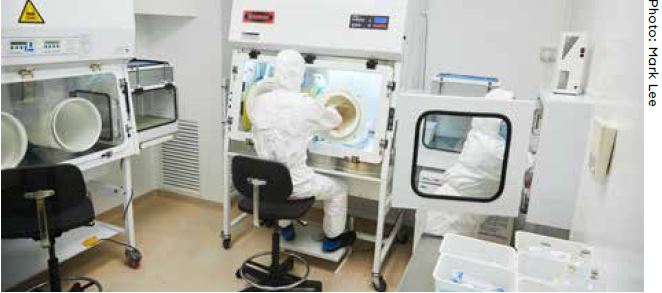
Pharmacy Technicians gown up in protective gear to prepare chemotherapy medication for blood cancer patients in a cytotoxic laboratory.
SGH’s Pharmacy Department has evolved beyond a drug-distributive role to one that is increasingly involved in the patient care journey.
 The discipline of pharmacy has existed for as long as there have been hospitals. In Singapore, the rudimentary origins of pharmacy can be traced back to 1821, when the first general hospital — the beginnings of Singapore General Hospital (SGH) — was established.
The discipline of pharmacy has existed for as long as there have been hospitals. In Singapore, the rudimentary origins of pharmacy can be traced back to 1821, when the first general hospital — the beginnings of Singapore General Hospital (SGH) — was established.
Medical apprentices were responsible for drug compounding and preparation. Formal pharmacy education became available in 1905 when the Department of Pharmaceutics was set up at King Edward VII College of Medicine.
Until the late 1980s, the Ministry of Health (MOH) produced generic drugs like painkillers and antibiotics. After MOH closed its pharmaceutical unit, the modern history of SGH’s Pharmacy Department started. In 1989, SGH was restructured and given greater autonomy to run its operations.
The department started with five to six pharmacists, and dispensing assistants (today’s pharmacy technicians or assistants). It now has almost 500 staff members, about 200 of whom are pharmacists.
A milestone was reached when pharmacists began working on medication prescription with clinicians on ward rounds — a practice pioneered by Dr Ang Hui Gek, currently Director of Allied Health, SGH.
As hospitals evolved towards multidisciplinary healthcare, pharmacists were integrated into clinical specialties, including transplantation, critical care, infectious diseases, and haematology-oncology.
In 1990, pharmacists began counselling patients on medications requiring strict compliance and monitoring, such as asthma inhalers, and warfarin, a blood thinner. Therapeutic drug monitoring was introduced as immunosuppressants, anti-epilepsy medications and antibiotics usually have to be adjusted within ranges to minimise side effects and maximise effectiveness.
These services mark the beginnings of personalised medicine. Pharmacists are directly involved in patient care, influencing drug choices, shaping medicine use with research, and empowering patients with knowledge to take charge of their health. Pharmacists also prescribe medicines under the Collaborative Prescribing Framework.
At Singapore’s first Anticoagulation Clinic, which started in 2000, pharmacists prescribe, monitor and adjust warfarin dosage under the oversight of a doctor. Other pharmacist-led clinics are the Inflammatory Bowel Disease Clinic established in 2007, and the Rheumatology Monitoring Clinic in 2009 — also Singapore’s firsts.
SGH pioneered the 2006 Antibiotic Stewardship Programme, where pharmacists optimise antibiotic usage hospitalwide to curb global antibiotic resistance. Now a key service in other hospitals, it is also on the national agenda. To curb antibiotic resistance, the department set up Singapore’s only pharmacist-run translation research laboratory in 2007. Associate Professor Andrea Kwa was the first pharmacist to obtain the national research award in 2013, and clinician scientist in 2018, for her work in this area.
SGH established career frameworks in the late 2000s to train and develop pharmacists in a structured manner. These pathways help build a sustainable and confident pharmacy workforce, and were adapted nationally.
Technology and automation have led to safer and more efficient pharmacy services like SGH’s Outpatient Automated Prescription Dispensing System and Inpatient Automated System, introduced in the early 2010s.
To keep patients safe and away from the hospital during the COVID-19 pandemic, SGH ramped up its Medication Delivery Service and introduced paperless prescriptions in 2021. Later this year, a Good Manufacturing Practices-certified National Compounding Hub is expected to be launched to produce ready-to-use parenteral nutrition bags, antibiotic eye drops and the like for SingHealth hospitals and centres to consolidate services for greater safety and efficiency.
Follow the celebrations at www.sgh.com.sg/sgh200 and on our social media platforms: Facebook (@SingaporeGeneralHospital), Instagram (@sghseen) and TikTok (@sghseen).













 Get it on Google Play
Get it on Google Play